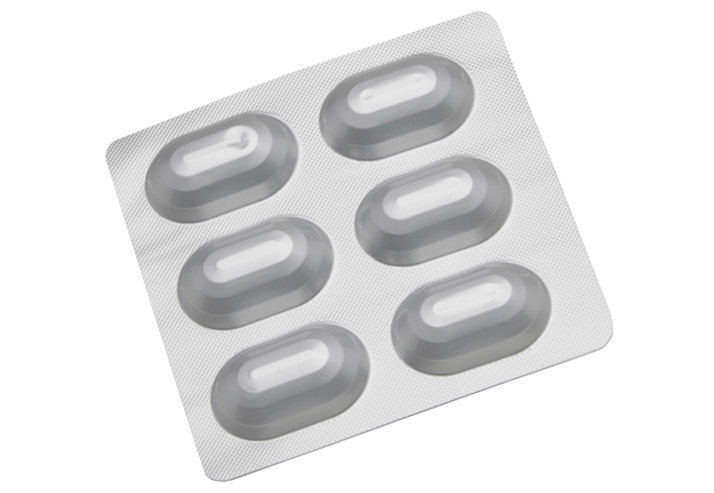Floxin
Floxin is a quinolone antibiotic from the fluoroquinolone group. The active substance is ofloxacin. It works by killing the bacteria responsible for infections. It is only active on certain strains of bacteria.
Floxin is indicated for treating the following bacterial infections:
- certain urinary tract infections (bladder and kidney infections);
- certain infections of the genital tract in men and women (e.g. gonorrhoea, a sexually transmitted disease);
- certain bone and joint infections;
- certain respiratory tract infections;
- certain sinus infections;
- certain skin infections;
- exposure to anthrax.
What Does Floxin Contain?

The active substance is: Ofloxacin 200 mg for one scored film-coated tablet.
The other components are:
Core: lactose, microcrystalline cellulose, maize starch, hydroxypropyl cellulose, polysorbate 80, sodium carboxymethyl starch type A, colloidal anhydrous silica, magnesium stearate, talc.
Film coating: OPADRY OY-S-58910 white (hypromellose, titanium dioxide, macrogol 400, talc).
Forms and Strengths
This medicine comes in the form of a scored, film-coated tablet. Box of 10 tablets.
How To Take
For adults
The usual dose is 400 mg/day in 2 doses (1 tablet containing 200 mg morning and evening).
For certain bronchial infections, the dosage is 400 mg/day in a single dose, i.e. 2 tablets containing 200 mg in a single dose.
In some cases, your doctor may prescribe a higher dose, depending on the severity of the infection.
Dosage may be adjusted for patients with impaired renal or hepatic function.
As part of exceptional treatments for children and adolescents.
As a guide, the dosage is 10 to 15 mg/kg/day taken twice daily, without exceeding 400 mg/day taken twice.
Method and route of administration
Take by mouth.
Swallow the tablets with a little water.
The tablets should be taken on an empty stomach or in the middle of a meal. Do not take Floxin at the same time as antacids.
Frequency of administration
1 to 2 times daily.
If your doctor has recommended that you take Floxin once a day, it is preferable to take it in the morning.
Duration of treatment
The absence of fever or other symptoms does not indicate that you are fully cured. Any fatigue you experience is not caused by the antibiotic. Reducing or stopping your treatment will not relieve this fatigue and may extend the time it takes for you to recover.
Side Effects
Uncommon side effects
- sensations of dizziness, headaches;
- agitation, sleep disorders, difficulty in sleeping;
- infections due to fungi, antibiotic-resistant germs;
- dizziness, headaches;
- eye irritation;
- dizziness;
- stomach pains, diarrhoea, nausea, vomiting;
- cough, nasopharyngitis;
- itching, skin rash.
Rare adverse reactions
- severe allergic reactions;
- psychiatric disorders e.g. visual or auditory impressions that are not real, a change in your opinion or thoughts with a risk of suicidal thoughts or acting out, anxiety, confusion, nightmares, depression;
- loss of appetite;
- delirium;
- visual disturbances;
- drop in blood pressure;
- drowsiness, tingling or pins and needles, taste disorders, disturbance of the sense of smell;
- rapid heartbeat;
- breathing difficulties, difficulty breathing;
- increased levels of enzymes that measure the functioning of the liver, increased quantities of bilirubin;
- inflammation of the intestine, sometimes with blood;
- urticaria, hot flushes, excessive sweating, rash on the skin with pus;
- increase in creatinine levels;
- inflammation of the tendons;
- memory problems;
- drop in blood sugar levels leading to coma. This is important for diabetics.
Very rare side effects
- severe allergic reactions;
- decrease in the number of red blood cells or certain white blood cells, high concentration of eosinophils, decrease in the cells present in the blood used for blood clotting;
- damage to the nerves of the limbs which may cause motor or sensory disorders, convulsions, neurological disorders such as tremors at rest, rigidity and slow movements, problems coordinating movements;
- jaundice;
- ringing or buzzing in the ears, hearing loss;
- severe, persistent diarrhoea, with the presence of blood or mucus in the stools;
- joint pain, muscle pain, rupture of tendons which may occur within 2 days of starting treatment and which may affect both sides of the body;
- skin reactions which may be severe, with blisters, skin reactions on exposure to the sun or UV light, rash due to the drug, "bruises" or small red spots on the skin, inflammation of the vessels which may exceptionally lead to serious skin damage;
- kidney failure.
Undetermined frequency
- Significant fall in the number of certain white blood cells;
- decrease or increase in blood sugar levels, generally in diabetic patients treated with anti-diabetic drugs;
- marrow failure;
- Nervousness, psychiatric disorders and depression that may be life-threatening, with suicidal thoughts or actions;
- hearing difficulties;
- tremor, uncontrollable movements, lack of taste; fainting;
- abnormally rapid heartbeat, irregular heartbeat that may be life-threatening;
- difficulty digesting, flatulence, constipation, inflammation of the pancreas;
- allergy of the lungs, severe breathing difficulties;
- liver damage, which may be severe; loss of appetite, yellowing of the skin and eyes, dark urine, itching or pain in the stomach. These symptoms may be signs of liver problems which could include fatal liver failure;
- reddening of the skin with extensive scaling;
- skin rash in the form of skin detachment which may rapidly and very severely spread to the whole body and which requires immediate medical attention;
- inflammation of the eye;
- aggravation of myasthenia;
- serious muscle damage, muscle weakness, muscle tears, muscle rupture, ligament rupture, joint disease causing pain with swelling and deformity;
- kidney damage;
- moderate increase in certain liver enzymes, exceptionally hepatitis;
- attacks of porphyria in patients with this hereditary disease;
- fatigue, fever, pain;
- persistent headaches with or without blurred vision.
Very rare cases of persistent or permanent adverse reactions, such as inflammation of tendons, rupture of tendons, joint pain, pain in the limbs, difficulty walking, abnormal sensations such as tingling, prickling, tickling, burning, Depression, fatigue, sleep disorders, memory disorders, as well as disorders of hearing, sight, taste and smell, have been associated with the administration of quinolone and fluoroquinolone antibiotics, sometimes independently of pre-existing risk factors.
Cases of widening and weakening of the aortic wall or tearing of the aortic wall, which may rupture and be life-threatening, and leakage of heart valves have been reported in patients receiving fluoroquinolones.
Precautions
If your doctor has informed you of an intolerance to certain sugars, contact him/her before taking this medicine.
Given the risk of tendonitis with this medicine, inform your doctor:
- if you are involved in strenuous sporting activity;
- if you have been taking corticosteroids for an extended period, as they may heighten the risk of tendonitis and tendon rupture when used concurrently with Floxin;
- and/or if you have previously suffered from tendonitis.
Never take Floxin:
- if you suffer from epilepsy;
- if you are allergic to ofloxacin, to other quinolones or to any of the other components of this medicine. Signs of an allergic reaction may include skin rash, difficulty in breathing or swallowing, swelling of the lips, face, throat or tongue;
- if you are a growing child or adolescent;
- if you have already had tendon problems with antibiotics of the same family as Floxin. A tendon connects the muscle to the skeleton;
- if you are pregnant or breast-feeding.
In children and adolescents
Floxin may be used in children from the age of 6 years and in adolescents, exceptionally, under the supervision of a specialist, to treat certain severe bacterial infections which cannot be treated with other antibiotics.
Before taking Floxin:
You should not take fluoroquinolone/quinolone antibiotics, including Floxin, if you have ever had a serious adverse reaction to a quinolone or fluoroquinolone. If this is the case, you should inform your doctor as soon as possible.
Tell your doctor if:
- you are taking corticosteroids;
- you have ever had kidney problems, as it may be necessary to adjust your treatment;
- you have ever had tendonitis;
- you have had a transplant;
- you have or have had neurological problems, including convulsions, or psychiatric problems;
- you have liver problems;
- you suffer from myasthenia, as this medicine may worsen your condition;
- if you have been diagnosed with an enlarged or "bulging" large blood vessel;
- you have a heart condition: caution is recommended when taking a medicine such as ofloxacin, if you were born with or have a family history of QT interval prolongation, or if you have an electrolyte imbalance, a very slow heart rate, a weak heart, a history of heart attack, or if you are female or elderly or if you are taking medicines that may cause certain abnormal changes in the ECG;
- if you have experienced a previous episode of aortic dissection;
- if you have been diagnosed with heart valve leakage;
- you are diabetic if you are taking concomitant anti-diabetic treatment, as a rise or fall in glycaemia, including hypoglycaemic comas, has already been observed in patients usually treated with anti-diabetic drugs;
- you or a member of your family have glucose-6-phosphate dehydrogenase deficiency, as you may be at risk of serious blood problems when you take this medicine.
While taking Floxin:
Stop taking Floxin and seek medical advice immediately if you experience any of the following serious side effects - you may need urgent medical treatment:
- sudden severe allergic reaction. From the first dose, there is a risk of a severe allergic reaction, which can present as symptoms such as chest tightness, dizziness, nausea, fainting, or dizziness upon standing. If you experience these symptoms, discontinue Floxin immediately as it may be life-threatening, and contact your doctor right away.
- this drop has been reported more frequently in the elderly, generally in diabetic patients. The drop in blood sugar levels can lead to coma. Alternative antibacterial treatment should be considered;
- the appearance of blisters with detachment of the skin, particularly around the mouth, eyes or genitals, which may rapidly spread throughout the body and be life-threatening. Tell your doctor immediately if any of the following reactions occur in your skin or mucous membranes;
- serious, long-lasting, disabling and potentially irreversible side effects.
Fluoroquinolone/quinolone antibacterial drugs, including this medicine, have been associated with very rare but serious adverse reactions, some of which may be persistent, disabling or potentially irreversible.
In rare cases, pain and swelling in the joints and inflammation or rupture of tendons may occur. The risk is greater if you are elderly (over 60), have had an organ transplant, have kidney problems or are taking corticosteroids.
If you experience any of these side effects after taking this medicine, contact your doctor immediately before continuing treatment. Together with your doctor, you will decide whether to continue your treatment, also considering the use of an antibiotic from another family.
More specifically in children, the risk of joint inflammation should be monitored more closely. If joint pain occurs in children during treatment with ofloxacin, the treatment should be interrupted and the affected joint rested. Tell your doctor immediately; specialist advice should be sought.
Psychiatric reactions may occur with Floxin.
If you suffer from epilepsy, you must not take this medicine. If you suffer from any other neurological disease, neurological side effectsmay occur. If they occur, stop taking Floxin and contact your doctor immediately.
In rare cases, symptoms of nerve damage such as pain, burning, tingling, numbness and/or muscle weakness may occur, particularly in the feet and legs or hands and arms.
Floxin may cause liver problems. If you notice any symptoms such as loss of appetite, jaundice, dark urine, itching or stomach tenderness, stop taking Floxin scored film-coated tablet and contact your doctor immediately.
Diarrhoea may occur when taking antibiotics, including Floxin, even several weeks after the end of treatment. If the diarrhoea becomes severe or persists, or if you notice blood or mucus in your stools, stop taking Floxin immediately, as your life may be in danger. Do not take any medicines intended to block or slow down bowel movements and contact your doctor.
If you have myasthenia gravis, and your condition worsens with weakness of the respiratory muscles, stop taking Floxin and contact your doctor immediately.
Tell your doctor immediately if any of the following occur during treatment with Floxin. Your doctor will decide whether you should stop taking this medicine.
If you suddenly feel short of breath, particularly when lying in bed, or if you notice swelling of your ankles, feet or abdomen, or a new onset of heart palpitations, you should inform a doctor immediately.
Floxin scored film-coated tablet may lower your white blood cell count and reduce your resistance to infection.
Tell your doctor or laboratory that you are taking Floxin if you are going to have any blood or urine samples taken.
If your vision becomes impaired or if you notice any problems with your vision, tell your doctor and consult an ophthalmologist immediately.
Taking Floxin can increase your skin's sensitivity to sunlight and ultraviolet light. During your treatment and for 48 hours after stopping your treatment, avoid prolonged exposure to the sun or to artificial UV rays such as those from tanning booths.
Tell your doctor if you or a member of your family have glucose-6-phosphate dehydrogenase deficiency, as you may develop anaemia with ofloxacin.
If you have any questions about the situations described above, talk to your doctor before taking Floxin.
Children
Not applicable.
Other medicines and Floxin
Floxin scored film-coated tablet may affect the effect of some medicines, and some medicines may affect the effect of Floxin scored film-coated tablet.
Tell your doctor if you are taking any of the medicines listed below as this may affect the occurrence of unwanted effects:
- corticosteroids. You may be at greater risk of inflammation and/or rupture of the tendons,
- theophylline. You may be prone to convulsions if you take Floxin,
- oral anticoagulants. You may be subject to bleeding. Your doctor will ask you to have blood tests to check your coagulation,
- medicines that can alter the heart rhythm such as medicines belonging to the anti-arrhythmic group, tricyclic antidepressants, certain antibiotics or certain antipsychotics,
- non-steroidal anti-inflammatory drugs such as aspirin, ibuprofen, fenbufen, ketoprofen, indomethacin. You may be prone to convulsions if you take Floxin,
- probenecid, cimetidine, furosemide or methotrexate.
Tell your doctor if you are taking :
- mycophenolate mofetil, as this medicine may be less effective;
- glibenclamide.
Do not take Floxin at the same time as the medicines listed below as they may affect the effect of Floxin: medicines containing iron, zinc, antacids containing magnesium or aluminium, sucralfate, strontium: take at a distance from Floxin (more than two hours).
Interactions with laboratory tests
Tuberculosis Tests: Laboratory tests for the bacteria that cause tuberculosis may be falsely negative when you take Floxin.
Urine tests on opiates: Floxin may give false-positive results when urine is tested for opiates. If a urine test is performed, tell the doctor that you are taking this drug.
Floxin with food and drink
Not applicable.
Beware of the risk of tendonitis if you engage in strenuous sporting activity.
Driving vehicles and using machines
Because of the risk of neurological disorders, in particular dizziness, drowsiness and visual disturbances, you should be aware of your own reaction to treatment before engaging in activities requiring a certain degree of vigilance, such as driving a vehicle or operating machinery.
Floxin contains lactose and sodium.
If your doctor has informed you of an intolerance to certain sugars, contact him/her before taking this medicine.
Pregnancy and Breastfeeding
If you are pregnant, breastfeeding, suspect you might be pregnant, or are planning to become pregnant, consult your doctor for advice before using this medication.
Floxin should not be used during pregnancy. If you discover that you are pregnant during treatment, consult your doctor immediately, as only he/she will be able to adapt the treatment to your condition.
It is not advisable to breast-feed after taking this medicine, as the product passes into breast milk.



